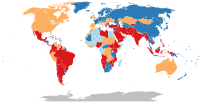
Photo from wikipedia
Abstract Objectives The objective of this cross-sectional study was to assess the attitudes of potential SNAP-Ed participants in Louisiana towards COVID-19 mitigation behaviors and their preferences for virtual nutrition education.… Click to show full abstract
Abstract Objectives The objective of this cross-sectional study was to assess the attitudes of potential SNAP-Ed participants in Louisiana towards COVID-19 mitigation behaviors and their preferences for virtual nutrition education. Methods SNAP-Ed staff in Louisiana distributed an electronic survey to potential participants and community partners which asked participants to report their attitudes about behaviors used to slow the spread of COVID-19 and preferences for the delivery of virtual nutrition education. Pearson chi squared tests were used to assess differences in responses across categories of race, age, and SNAP-Ed eligibility. Unadjusted odds ratios were then calculated using logistic regression to evaluate the effects of race, age, and SNAP-Ed eligibility on each dependent variable of interest. Finally, adjusted odds ratios were calculated using a model which included age, eligibility for SNAP-Ed, and race. Results Of 458 participants, the majority were white (62%), female (91%), aged 18–50 (65%), and eligible for SNAP-Ed (57%). Most agreed with the importance of handwashing (99%), maintaining physical distance (95%), and wearing face masks (79%). African Americans had significantly higher odds of agreeing that it was important to wear a mask compared to white participants, and this did not change in the adjusted model which included SNAP-Ed eligibility and age category (Adjusted OR 15.90 [6.25, 40.4]) African Americans were also more concerned about the risk posed by in-person programming and more likely to report that they would prefer live virtual lessons, online quizzes, and workbooks than white participants. Conclusions It may be appropriate for nutrition education conducted with this population to occur in person, because most potential participants agree with COVID-19 precautions. However, educators working with majority white populations should exercise caution given that the participants who felt it was not important to wear masks were overwhelmingly white. Attitudes expressed by African American participants indicate that nutrition education for African Americans may better reach participants if it is done virtually rather than in-person. Funding Sources SNAP-Ed
Journal Title: Current Developments in Nutrition
Year Published: 2021
Link to full text (if available)
Share on Social Media: Sign Up to like & get
recommendations!